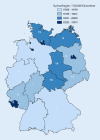[Atopic dermatitis-identifying needs in the German population by internet search queries]
- PMID: 35294564
- PMCID: PMC8925291
- DOI: 10.1007/s00105-022-04974-x
[Atopic dermatitis-identifying needs in the German population by internet search queries]
Abstract
Background: The internet is one of the most important sources for health-related information for the general population. Therefore, the analysis of internet search engines can help to capture the social interests and needs regarding diseases.
Objectives: The aim of this study was to investigate the search queries related to atopic dermatitis (AD) regarding frequency, focus of interest and temporal occurrence in the German federal states in order to identify possible regional differences.
Material and methods: Using the Google Ads Keyword Planner, AD relevant keywords including the monthly search volume between January 2017 and December 2020 were identified, which were then assigned to different categories.
Results: Overall, 1419 keywords were found that had a search volume of 14,817,610 queries. The category 'general' had the highest search volume (n = 5,970,840), but most keywords were assigned to the category 'location' (n = 348). About 60% of the keywords assigned to 'location' were related to AD on the face. On a national level, Bremen and Hamburg had the highest search volume per 100,000 inhabitants. With more than 70%, an enormous increase in search volume could be observed, which was especially high in 2020.
Discussion: With this internet search analysis, it was possible to clarify which aspects of AD were of particular importance for the German population, which can help to adapt information campaigns to the target population. In addition, the study underlines the increasing relevance of the internet as a source of information regarding health-related topics.
Zusammenfassung: HINTERGRUND: Das Internet ist eine der wichtigsten Informationsquellen für gesundheitliche Themen für die Allgemeinbevölkerung. Deshalb kann die Analyse von Internetsuchmaschinen dabei helfen, die gesellschaftlichen Interessen und Bedürfnisse bezüglich Erkrankungen zu erfassen. ZIEL: Ziel dieser Studie war es, die Suchanfragen zu atopischer Dermatitis (AD) in Bezug auf Häufigkeit, Interessenschwerpunkt und zeitliches Auftreten in allen deutschen Bundesländern zu untersuchen, um mögliche regionale Unterschiede zu identifizieren.
Material und methoden: Mithilfe des Google Ads Keyword Planner wurden AD relevante Keywords inklusive deren monatlichen Suchvolumens zwischen Januar 2017 und Dezember 2020 identifiziert, die in Interessenschwerpunkte unterteilt wurden.
Ergebnisse: Es wurden 1419 Keywords gefunden, die ein Suchvolumen von 14.817.610 Anfragen hatten. Das größte Suchvolumen hatte die Kategorie Allgemein (n = 5.970.840), jedoch wurden der Kategorie Lokalisation die meisten Keywords zugeordnet (n = 348). Rund 60 % der Keywords zu Lokalisation bezogen sich auf AD im Gesicht. Von allen Bundesländern hatten Bremen und Hamburg das größte Suchvolumen pro 100.000 Einwohner. Mit über 70 % war ein enormer Anstieg im Suchvolumen zu beobachten, der v. a. 2020 sichtbar wurde.
Diskussion: Durch diese Internetsuchmaschinenanalyse konnte verdeutlicht werden, welche AD-relevanten Aspekte von besonderer Bedeutung für die Bevölkerung waren, was dabei helfen kann, Informationskampagnen zielgerichtet anzupassen. Zudem unterstreicht die Studie die immer größer werdende Relevanz des Internets als Informationsquelle für gesundheitliche Themen.
Keywords: Atopic eczema; Google; Health information; Infodemiology; Location; Time trend.
© 2022. The Author(s).
References
-
- ARD ZDF Onlinestudie 2020. https://www.ard-zdf-onlinestudie.de/files/2020/2020-10-12_Onlinestudie20.... Zugegriffen: 31. Mai 2021
-
- Barmer (2021) Barmer-Analyse – Vor allem Kinder und Frauen leiden unter Neurodermitis. https://www.barmer.de/presse/presseinformationen/pressemitteilungen/barm.... Zugegriffen: 31. Mai 2021
-
- Bundesamt für Kartographie und Geodäsie (2022) Nicht-administrative Gebietseinheiten. https://gdz.bkg.bund.de/index.php/default/digitale-geodaten/nicht-admini.... Zugegriffen: 14. Febr. 2022
-
- Bundesinstitut für Bau‑, Stadt- und Raumforschung (2021) INKAR – Indikatoren und Karten zur Raum- und Stadtentwicklung. https://www.inkar.de/Default. Zugegriffen: 31. Mai 2021
MeSH terms
LinkOut - more resources
Full Text Sources





